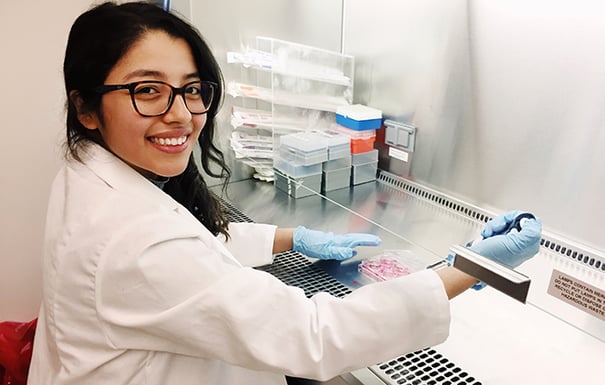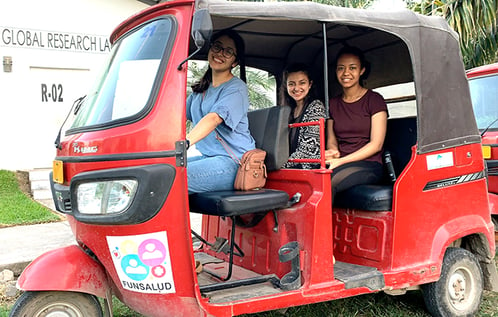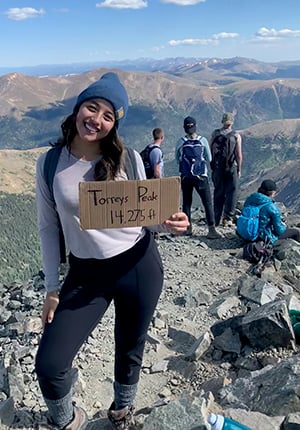Besides being a bright and hard-working student, Odalis Castro has an uncanny knack for cultivating mentors.
It’s her many advisers, however, who end up marveling at the insights and energy of the young woman. They are in awe of the smarts and drive it took Castro – a first-generation college student – to navigate the complex world of higher education, earn a bioengineering degree and land a Fulbright scholarship to study cancer in Poland.
But to the humble Castro, going above and beyond is just what it takes to overcome roadblocks and to bring her scientific dreams into sharp focus.

Odalis Castro works in a lab on the CU Anschutz Medical Campus. |
Castro was among a cohort of 33 bioengineering students, part of a dual-campus (CU Anschutz and CU Denver) bioengineering program, who received Bachelor of Science degrees on May 14. Her parents, natives of Mexico, proudly watched their oldest child, who was born in the United States, graduate via livestream.
Access struggles inspire a career
An experience in her youth motivated Castro to pursue a healthcare career. She vividly recalls the healthcare access hurdles – language and cultural barriers were among the challenges – her family faced when her mother was pregnant with her younger sister.
“Where I went to high school, there was a lack of preparation for college,” she said. “I always had a curiosity for science but felt unprepared because I didn’t even know where to start looking.”
A great mentor, a key opportunity
So, as a freshman at CU Denver, Castro showed her spunk and began cold emailing professors at CU Anschutz, asking if she could work in a lab. One of the professors, Clyde Wright, MD, was more than happy to give Castro, who was working 30 hours a week as a receptionist in the Children’s Hospital Colorado dental clinic on top of a full class load, an opportunity to learn the scientific process in his lab.
Wright, an associate professor in pediatrics-neonatology in the University of Colorado School of Medicine, recalls being immediately impressed by Castro’s gumption. “It’s just part of her. She was curious and knew what she wanted to do with her life. She knew that ‘Hey, if I really want to do this, I probably need to get some exposure (to lab work) and position myself,’” he said. “That’s very insightful for someone who had a lot on her plate.”
Wright’s lab studies ways the innate immune response to inflammatory stimuli affects the developing lung, and Castro became an important contributor over her four-year college career. She earned an Undergraduate Research Opportunities Program grant to fund her own project investigating sex-specific differences in the innate immune response to inflammatory stress in the perinatal period.
‘Odalis Day’
“My entire lab staff looks forward to an ‘Odalis day’ – she brings an energy and a curiosity to lab that is infectious!” Wright said in a Fulbright recommendation letter he wrote for Castro. “These innate qualities will serve her well in completing the proposed project in a new lab setting in Poland.”

Odalis Castro, left, with peers at the Trifinio Center for Human Development in Guatemala. |
Personal experience also guided Castro’s interest in applying for a U.S. Student Fulbright award that allows her to conduct skin cancer research at Jagiellonian University in Kraków, Poland.
During her two years at CU Anschutz, studying in the Center for Bioengineering in the CU School of Medicine, Castro volunteered at the DAWN Clinic, a student-run free clinic that provides healthcare to underserved populations in Aurora. She noticed that many patients were uninformed about the harmfulness of UV rays.
Hopes to advance skin cancer therapies
“I developed an awareness of skin cancer and skin damage particularly in people of color,” Castro said. At the lab in Poland, “our goal is to pinpoint certain mechanisms that could be targeted therapeutically at the molecular level to combat non-melanoma skin cancer.”
Her mother is already making plans to travel overseas for a visit. “And I haven’t even left yet,” Castro said, laughing.
This won’t be the first trip abroad for the young scientist. At the suggestion of Cassandra Howard, a senior instructor in the Department of Bioengineering, Castro spent a winter term studying at the Triangle Global Research Lab in Trifinio, Guatemala.
“When I came back, (Howard) encouraged me to continue to be involved in global health technologies,” Castro said. “During COVID, parts of Guatemala were having a shortage of PPE, and they asked us in the Bioengineering Program to design a UV light box that would keep their equipment clean in the space where they were working. We designed that in like four days.”
At CU Anschutz, Castro has also been involved in WiSTEM, an organization for women in STEM (science, technology, engineering and math) and the Engineers Without Borders COVID Task Force.
Taking advantage of ‘pitch nights’
Castro has also enjoyed “pitch nights” where clinicians at Children’s Hospital Colorado and UCHealth University of Colorado Hospital meet with bioengineering students to pitch ideas for biomedical devices. “That’s been one of the highlights of the program; you see whatever design you’re working on is for someone who actually needs it,” she said. “There’s a lot of communication between the engineering team and clinicians. There are just so many opportunities.”

Odalis Castro atop Torreys Peak, one of Colorado's fourteeners. |
With every hurdle cleared and experience gained in her promising young career, Castro takes stock of the mentors who’ve helped her along the way.
Besides the research endeavors overseas, Castro looks forward to being a cultural ambassador for the United States. Working alongside the U.S. Embassy in Poland, she will host events for Polish students seeking information about U.S. educational opportunities. She will also volunteer for a nonprofit organization that exposes girls to STEM careers.
Plans to give back
Wright is not surprised that Castro is already pursuing mentorship opportunities. “I have no doubt that now that Odalis is on the path to success and independence, she will be one of the people who provides these opportunities to other people,” he said.
Indeed, those freshman-year emails – and the professor who gave her a chance and never judged, even when she had an unsuccessful experiment – are fresh in Castro’s memory as she reflects on her time at CU.
“I’m looking at him and thinking, ‘Why do you do this for students?’” she said. “I think it’s about that whole process of giving back. When you have that great experience (like in Dr. Wright’s lab) you want to do that for others as well. I hope to have my own lab and have first-generation students just come – and it’s OK if they don’t have any science experience – and learn and follow that dream.”

.png)
.jpg)
